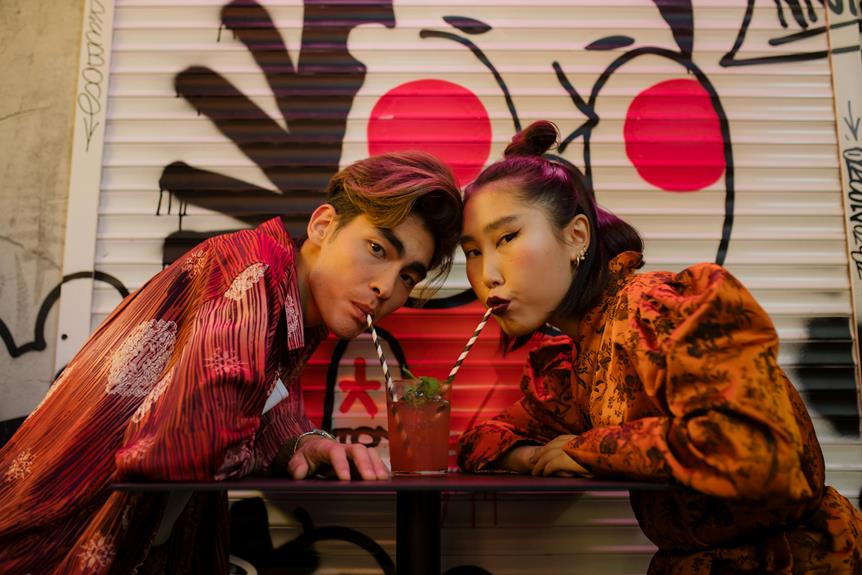When you sit down at a Chinese restaurant for some dim sum, have you ever wondered about the tea they serve alongside those delectable dishes? The choice of tea can truly elevate your dining experience, adding layers of flavor and enhancing the overall enjoyment of the meal. But what exactly are the different types of teas commonly served with dim sum, and how do they complement the various flavors and textures of these bite-sized delights? Let's explore the fascinating world of Chinese teas and the art of pairing them with dim sum dishes for a truly delightful culinary adventure.
Key Takeaways
- Chinese restaurants serve Liu Bao tea with dim sum for its unique earthy, woody, and sweet taste.
- Liu Bao tea's mellow and smooth flavor enhances the dining experience and complements dim sum dishes.
- The deep amber liquor of Liu Bao tea adds to the enjoyment and pairs well with the complex flavors of dim sum.
- Step out of the comfort zone to savor Liu Bao tea, a lesser-known option for a delightful tea-drinking experience.
- Liu Bao tea's distinctive taste profile, perfect for palate cleansing, contributes to the overall enjoyment of dim sum.
Classic Jasmine Tea
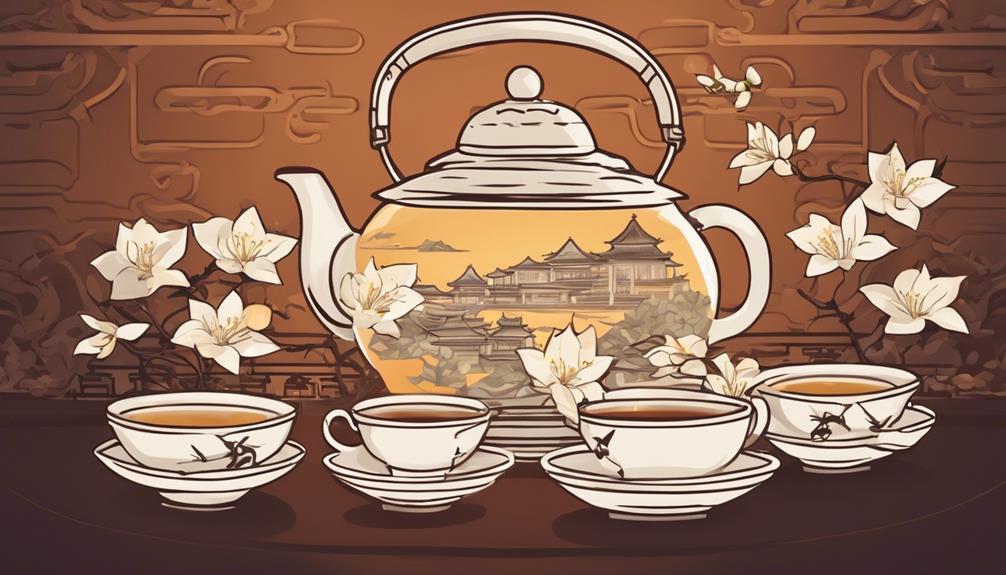
When enjoying dim sum, make sure to savor the classic jasmine tea for its delicate floral aroma and soothing taste. Jasmine tea, a staple in Chinese cuisine, is a fragrant and rejuvenating beverage that complements the flavorful dishes typically served during dim sum meals.
The jasmine flowers used to scent the tea impart a subtle sweetness and floral essence that pairs perfectly with the savory and sometimes spicy flavors found in dim sum dishes.
Traditionally, jasmine tea is made by blending green tea leaves with fresh jasmine blossoms multiple times to infuse the tea with the flowers' aroma. This meticulous process results in a tea that isn't only aromatic but also carries a light and invigorating taste that cleanses the palate between bites of dumplings, buns, and other dim sum delights.
Next time you find yourself indulging in a dim sum feast, be sure to take a moment to appreciate the simple yet elegant charm of classic jasmine tea, a beverage that enhances the overall dining experience with its delightful fragrance and smooth flavor.
Fragrant Oolong Varieties
Explore the diverse world of fragrant oolong varieties to elevate your dim sum experience with unique aromas and flavors. Oolong teas are known for their partially oxidized leaves, resulting in a wide range of fragrances and tastes.
Tie Guan Yin, a popular fragrant oolong, offers a floral aroma with a smooth, slightly sweet flavor profile. Its light oxidation creates an invigorating brew that complements the rich and savory dishes often found in dim sum.
For a more robust option, consider trying Da Hong Pao oolong. This variety boasts a complex flavor profile with notes of roasted nuts and a lingering fruity sweetness. Da Hong Pao's deep, rich taste pairs well with heartier dim sum dishes like barbecue pork buns or pan-fried dumplings.
Another fragrant oolong to explore is Jin Xuan, also known as Milk Oolong. This tea is famous for its creamy mouthfeel and buttery taste, reminiscent of sweet milk. Jin Xuan's unique flavor can add a luxurious touch to your dim sum experience, making it a delightful choice to savor alongside your favorite dishes.
Robust Pu-erh Options
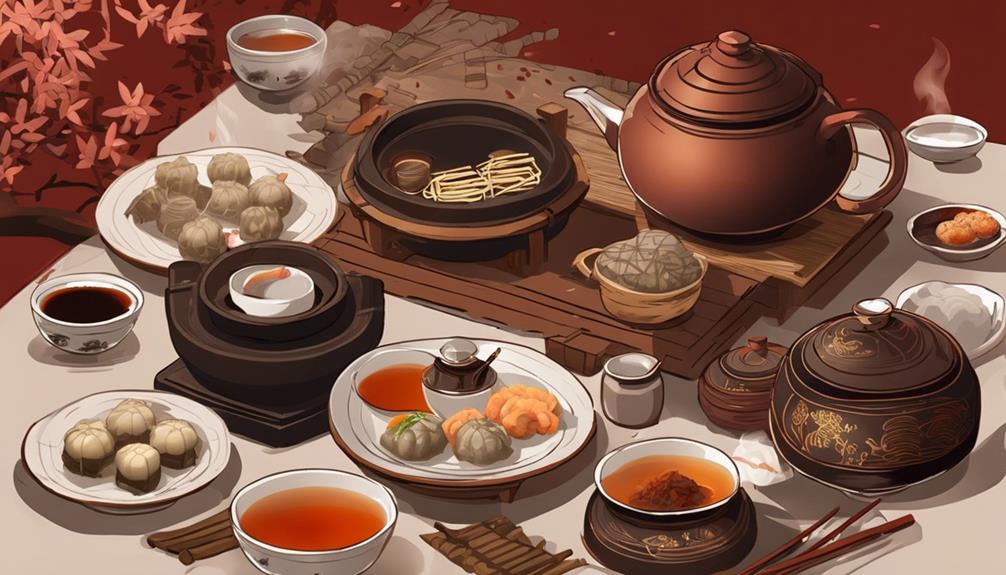
Consider sampling a selection of robust Pu-erh teas to complement the diverse flavors of your dim sum dishes. Pu-erh teas are known for their earthy, rich flavors that can stand up well to the bold and savory tastes often found in dim sum cuisine. Here are some robust Pu-erh options to enhance your dining experience:
| Pu-erh Tea Type | Flavor Profile | Recommended Pairing |
|---|---|---|
| Shou (Ripe) | Smooth, Mellow, Earthy | Fried Dim Sum, Meat Dishes |
| Sheng (Raw) | Brisk, Floral, Fruity | Steamed Dim Sum, Seafood |
| Aged Pu-erh | Woody, Complex | Roasted Dim Sum, Spicy Dishes |
These Pu-erh varieties offer a spectrum of flavors that can elevate the taste of your dim sum dishes. Whether you prefer a smooth and mellow brew or a brisk and floral cup, there is a Pu-erh tea that can cater to your palate while harmonizing with the array of flavors found in traditional dim sum fare.
Delicate White Tea Selections
Discover a range of delicate white tea selections that can enhance the subtle flavors of your dim sum dishes.
White tea, known for its delicate and subtle nature, pairs beautifully with the light and intricate flavors often found in dim sum.
Bai Hao Yin Zhen, also known as Silver Needle, is a highly prized white tea made of young tea buds. Its light and sweet flavor profile complements dishes like steamed dumplings and rice rolls.
Bai Mu Dan, or White Peony, is another popular choice with a slightly stronger taste than Silver Needle, making it a versatile option to accompany various dim sum dishes.
If you prefer a more floral note, consider trying Jasmine Silver Needle, a fragrant white tea infused with jasmine blossoms that adds a revitalizing touch to your dining experience.
These delicate white teas provide a gentle and nuanced balance to the array of flavors found in dim sum, elevating your meal to a delightful culinary experience.
Herbal Chrysanthemum Infusions
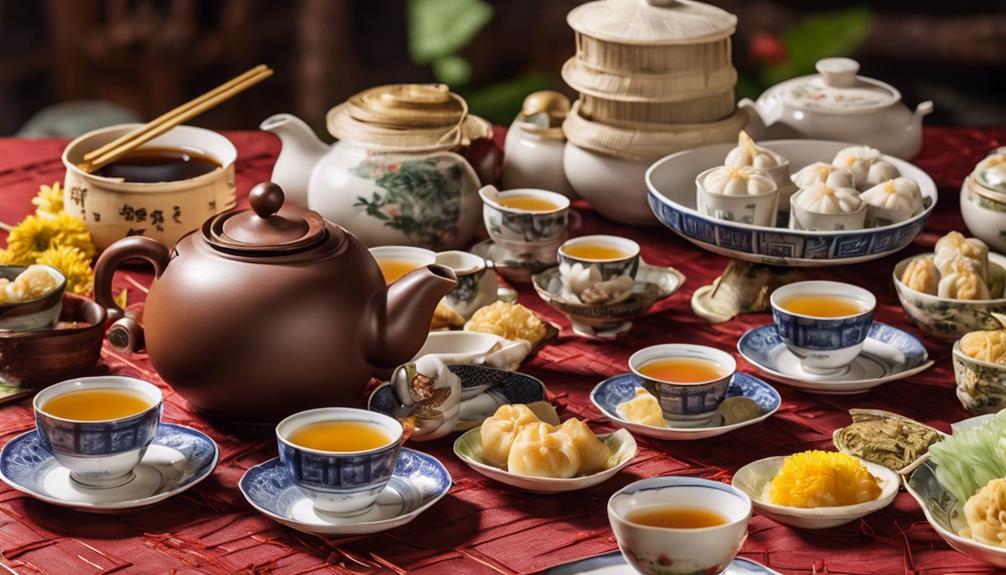
Enhance your dim sum experience with the fragrant and soothing notes of herbal Chrysanthemum infusions. Chrysanthemum tea is a popular choice in Chinese restaurants due to its light and floral taste, making it a perfect companion to dim sum dishes. This herbal infusion is known for its calming properties and invigorating aroma, cleansing your palate between each delectable bite.
Consider the following varieties of Chrysanthemum infusions that you might encounter in Chinese restaurants:
| Chrysanthemum Infusion Type | Flavor Profile | Benefits |
|---|---|---|
| White Chrysanthemum | Delicate and floral | Rich in antioxidants |
| Yellow Chrysanthemum | Mellow and sweet | Supports skin health |
| Gongju Chrysanthemum | Robust and earthy | Helps with relaxation |
Each type offers a unique taste and potential health benefits, adding a layer of enjoyment to your dim sum experience. Next time you dine at a Chinese restaurant, don't hesitate to sip on a cup of herbal Chrysanthemum infusion alongside your favorite dim sum dishes.
Aromatic Tieguanyin Tea
Allow yourself to savor the fragrant allure of Aromatic Tieguanyin Tea as you explore its rich and complex flavors. This oolong tea, also known as Iron Goddess of Mercy, originates from the Fujian province in China. Aromatic Tieguanyin Tea is prized for its floral aroma, which is reminiscent of orchids and lilacs, and its velvety smooth texture.
The taste profile of Aromatic Tieguanyin Tea is both nuanced and enchanting. You may notice a delicate balance of floral notes with a hint of creaminess and a subtle touch of mineral undertones. The tea leaves are traditionally rolled into tight balls, which unfurl beautifully during steeping, releasing a spectrum of flavors that evolve with each infusion.
When enjoying Aromatic Tieguanyin Tea with dim sum, its floral and creamy notes complement a wide range of dishes, from steamed dumplings to crispy spring rolls. The tea's soothing aroma and complex taste make it a delightful choice to enhance your dim sum dining experience.
Refreshing Green Tea Choices
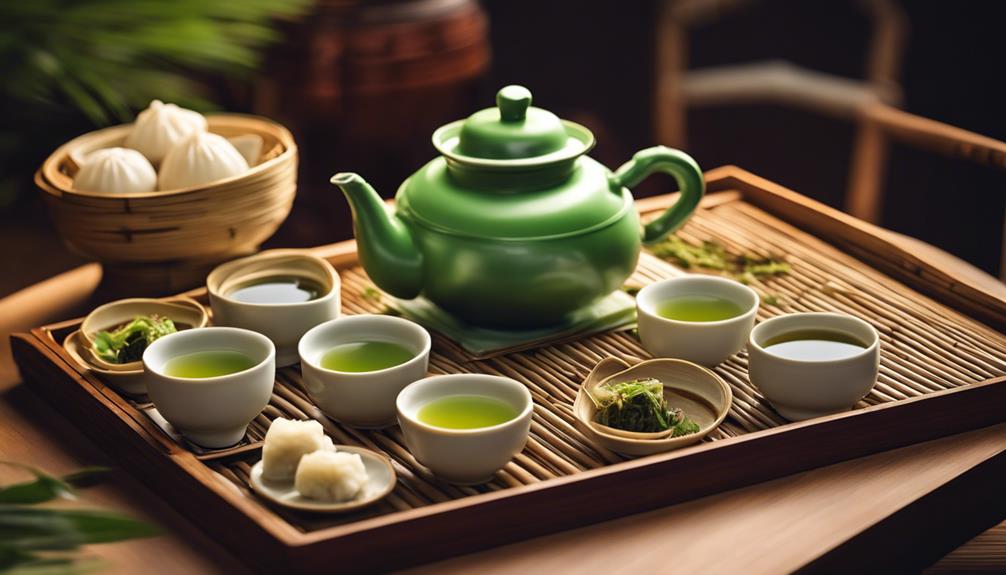
Explore a variety of invigorating green tea options to elevate your tea experience and complement your dim sum selection. Green tea is a popular choice in Chinese restaurants due to its light, invigorating taste that pairs well with the richness of dim sum dishes.
When dining on dim sum, consider trying classic green tea varieties like Longjing, also known as Dragon Well tea, which offers a delicate flavor with a hint of chestnut. Another excellent option is Bi Luo Chun, a green tea known for its fruity and floral notes that can enhance the overall dining experience.
For a more robust flavor profile, you might enjoy the nutty taste of Huangshan Maofeng green tea or the slightly sweet and vegetal notes of Tai Ping Hou Kui. These green teas can provide a unique and satisfying accompaniment to your dim sum feast.
Experimenting with different green tea varieties can add a new dimension to your dining experience and help you discover your favorite pairing with dim sum.
Lesser-Known Liu Bao Tea
When looking to broaden your tea horizons beyond the familiar green tea options, consider trying the lesser-known Liu Bao tea to accompany your dim sum experience.
Liu Bao tea, a fermented dark tea originating from Guangxi, China, offers a unique flavor profile that can complement the rich and savory dishes commonly found in dim sum menus.
Unlike the more popular green teas, Liu Bao tea undergoes a fermentation process that gives it a distinct earthy and woody taste with hints of sweetness. Its smooth and mellow flavor makes it a perfect choice to cleanse your palate between bites of crispy spring rolls or steamed dumplings.
The deep amber liquor of Liu Bao tea pairs well with a variety of dim sum dishes, enhancing the overall dining experience with its complex yet balanced notes.
Next time you find yourself at a Chinese restaurant enjoying dim sum, step out of your comfort zone and savor the lesser-known Liu Bao tea for a delightful and satisfying tea-drinking experience.
Conclusion
Next time you enjoy dim sum at a Chinese restaurant, be sure to try their selection of teas.
From classic Jasmine Tea to the lesser-known Liu Bao Tea, there are plenty of options to enhance your dining experience.
Each tea offers a unique flavor profile that complements the variety of dim sum dishes, providing a satisfying and delightful tea-drinking experience.
Don't miss out on this perfect pairing for your next meal!
